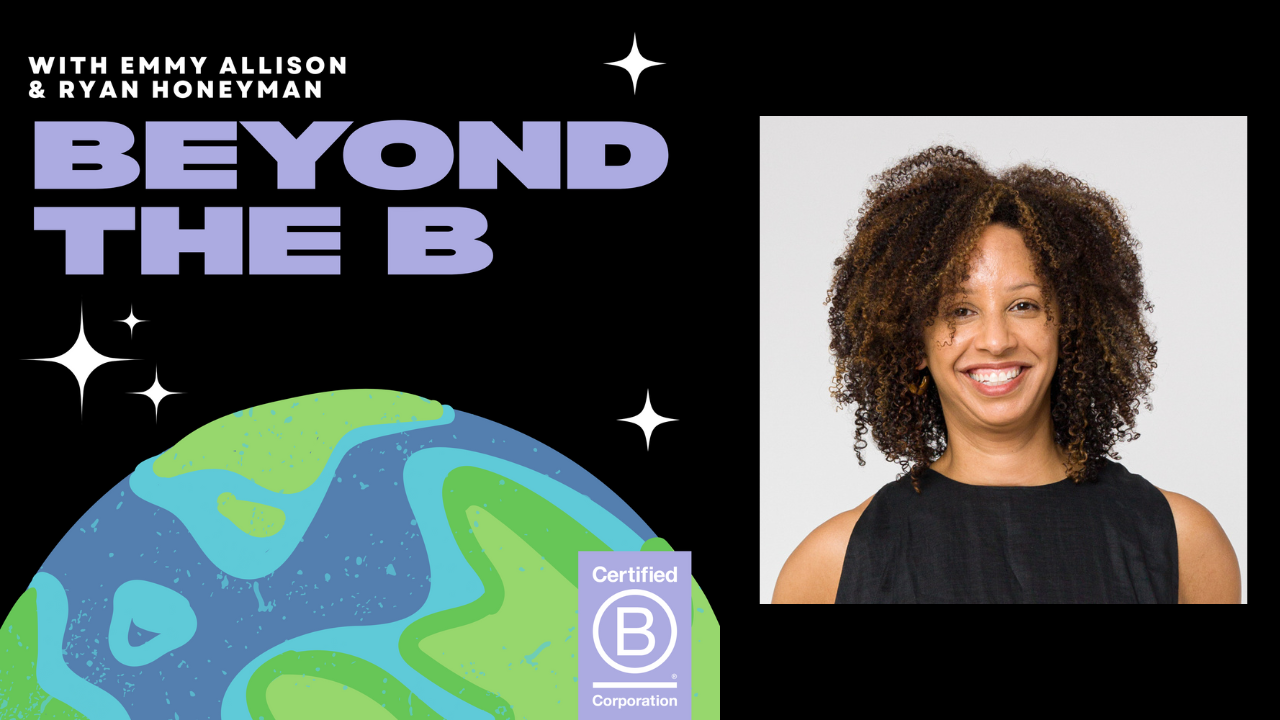Red Hat Participates in Fall 2016 B Corp Clinic
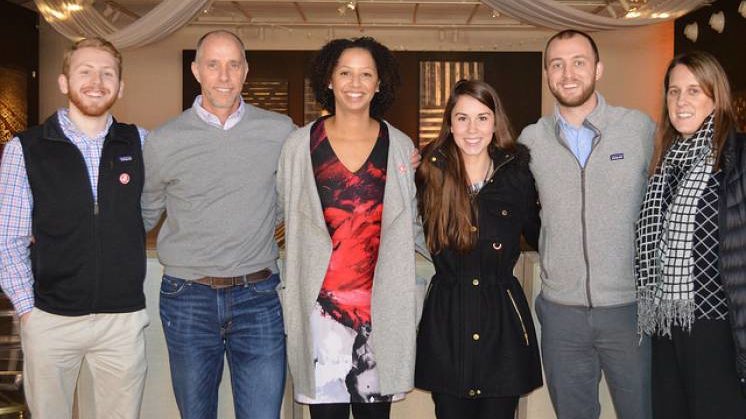
By Carla Davis, NC State Sustainability Office Communications
Contributions from Anna Campbell, Poole College Communications
Is a for-profit company’s only goal to generate profit?
A growing number of Triangle-area businesses now also consider social and environmental impact as measures of success, and a cohort of local college students are helping quantify and amplify that impact.
NC State’s B Corp Clinic matches students as volunteer consultants for local companies seeking certification as a B Corporation. B Corps, as they’re commonly known, are certified by the nonprofit B Lab for best practices in environmental responsibility, social impact, accountability and transparency. Nearly 2,000 companies in 50 countries are B Corp certified.
During the fall semester, 28 students helped six companies navigate the rigorous B Impact Assessment. Businesses that score at least 80 points on the assessment achieve B Corp certification.
“The certification is a tool to track business impact,” said Jessica Thomas, director of the Business Sustainability Collaborative at NC State’s Poole College of Management. “B Corp Clinic provides a resource for businesses in our community, as well as a learning opportunity for students.”
Companies participating in B Corp Clinic range in size from small startups to global corporations such as Red Hat, an open source technology company headquartered in downtown Raleigh. With 9,300 employees worldwide, Red Hat is striving to become one of the first large, multinational tech firms to become B Corp certified.
“There’s lack of precedent for an organization of this size and scope [to achieve certification],” said Ben Bradley, an NC State Jenkins MBA student.
Red Hat Team
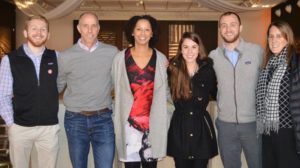
Left to right: Christopher Aud, B.S. Business, NC State, Greg Norton (team coach), R+M Agency, Jessica Thomas (team coach), NC State, Kaley Moffitt, B.A. Business, NC State, Ben Bradley (team lead), Jenkins MBA, NC State, Jessica Steinberg, Fuqua MBA, Duke. Not pictured: Chris Morse (company representative), Red Hat, Irinie Habib, Kenan-Flagler MBA, UNC Chapel Hill, Ray Jang, Kenan-Flagler MBA, UNC Chapel Hill
Bradley and other students on the Red Hat team spent the semester learning the complexities of Red Hat while also working closely with B Lab on molding future standards and best practices for multinational companies. For example, when a company has 80 locations worldwide, should calculations for living wage be based on every location’s economy or the average of all locations?
Students reviewed Red Hat’s baseline score on the B Impact Assessment and worked with employees in four departments to evaluate possibilities of achieving additional points. Some members of the team will return to the project in the Spring semester when they begin implementing some of the recommendations created by the team.
“Setting the mold is challenging. It’s a big thing and it’s not going to be an overnight success. But the ball is rolling,” Bradley said.
Seal the Seasons Team
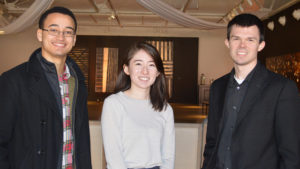 Left to right: Aidan Special, B.S. Textiles Technology, NC State, Ashley Maurice, CHASS, NC State, Joseph Boulding (team lead), B.S. Environmental Sciences, NC State. Not pictured: Daniel Waldorff (company representative), Seal the Seasons, Christina Noel (team coach), The Redwoods Group, Hannah Taylor, B.A. French and International Studies, Adam Fisher, Jenkins MBA, NC State
Left to right: Aidan Special, B.S. Textiles Technology, NC State, Ashley Maurice, CHASS, NC State, Joseph Boulding (team lead), B.S. Environmental Sciences, NC State. Not pictured: Daniel Waldorff (company representative), Seal the Seasons, Christina Noel (team coach), The Redwoods Group, Hannah Taylor, B.A. French and International Studies, Adam Fisher, Jenkins MBA, NC State
In navigating the B Impact Assessment, students learn about sustainable business practices. The team of students working with Seal the Seasons, a local food company, created formal policies for sustainable packaging procurement, mechanisms for tracking employee volunteer hours and better governance processes. They also verified points the company should receive for offering paid family leave, a living wage and stock options for employees, policies for choosing sustainable suppliers, energy use monitoring and waste reduction efforts.
Tilthy Rich Compost Team
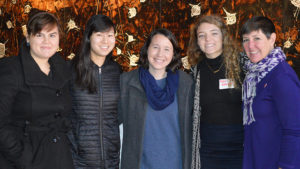 Left to right: Ari Alexandrescu, B.S. Economics, NC State, Aisa Ledesma (team lead), Kenan-Flagler MBA, UNC Chapel Hill, Kat Nigro (company representative), Tilthy Rich Compost, Kamila Edwards, B.S. Sustainable Materials and Technology, Tracy Triggs-Matthews (team coach), Kenan-Flagler, UNC Chapel Hill. Not pictured: Anne Luke, B.S. Business, NC State, Kitt Wolfenden, Kenan-Flagler MBA, UNC Chapel Hill.
Left to right: Ari Alexandrescu, B.S. Economics, NC State, Aisa Ledesma (team lead), Kenan-Flagler MBA, UNC Chapel Hill, Kat Nigro (company representative), Tilthy Rich Compost, Kamila Edwards, B.S. Sustainable Materials and Technology, Tracy Triggs-Matthews (team coach), Kenan-Flagler, UNC Chapel Hill. Not pictured: Anne Luke, B.S. Business, NC State, Kitt Wolfenden, Kenan-Flagler MBA, UNC Chapel Hill.
For Durham-based compost collection and delivery company Tilthy Rich, students created a framework for an employee handbook and recommendations that could boost the business into certified status.
Sweeps Team
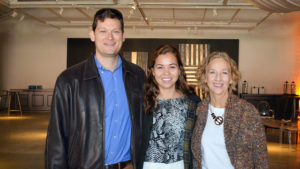 Left to right: Charlie Hobbs, Sweeps, Elizabeth Day, B.S. Business, NC State, MaryLou Gelblum, Sweeps. Not pictured: Morris Gelblum (company representative), Sweeps, Liz Tracy (team coach), HQ Raleigh, Ajinkya Andhare (team lead), Jenkins MBA, NC State, Ashish Kapoor, B.S. Fiber & Polymer Science, NC State.
Left to right: Charlie Hobbs, Sweeps, Elizabeth Day, B.S. Business, NC State, MaryLou Gelblum, Sweeps. Not pictured: Morris Gelblum (company representative), Sweeps, Liz Tracy (team coach), HQ Raleigh, Ajinkya Andhare (team lead), Jenkins MBA, NC State, Ashish Kapoor, B.S. Fiber & Polymer Science, NC State.
Another student team used similar tactics to boost the score for Sweeps, a Raleigh-based company that connects college students with people needing a home, moving or other help. “It’s not just about the score but about laying the foundation for the future of Sweeps,” said team leader Ajinkya Andhare, a Jenkins MBA student.
REAP Team
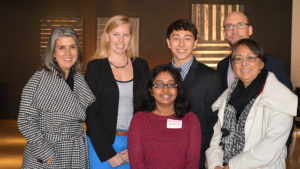 Left to right: April Montgomery (company representative), REAP, Sara Flowe, Kenan-Flagler MBA, UNC Chapel Hill, Haripriya Ramesh, Kenan-Flagler MBA, UNC Chapel Hill, Shawn Blazer, B.S. Environmental Science, NC State, Jonathan Navarro (team lead), Jenkins MBA, NC State, Rosanna Garcia (team coach), NC State. Not pictured: Jamieson Stapleton, B.S. Sustainable Materials, and Technology, NC State.
Left to right: April Montgomery (company representative), REAP, Sara Flowe, Kenan-Flagler MBA, UNC Chapel Hill, Haripriya Ramesh, Kenan-Flagler MBA, UNC Chapel Hill, Shawn Blazer, B.S. Environmental Science, NC State, Jonathan Navarro (team lead), Jenkins MBA, NC State, Rosanna Garcia (team coach), NC State. Not pictured: Jamieson Stapleton, B.S. Sustainable Materials, and Technology, NC State.
Students working with REAP, a Sanford-based development services consulting firm, created a step-by-step roadmap for the company’s path to certification. Additionally, the team focused on two categories of the assessment, helping nearly double the company’s initial score.
Firsthand Foods Team
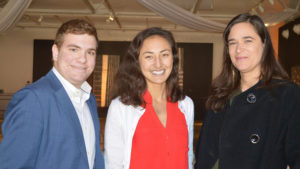 Lef to right: Eric Schwartz, B.S. Business, NC State, Sierra Ponthier, B.A. Environmental Studies, Davidson, Tina Prevatte (company representative), Firsthand Foods. Not pictured: Katie Kross (team coach), Duke, Abraham Katz, Kenan-Flagler MBA, UNC Chapel Hill (team lead), Kayla Klinc, B.S. Business, NC State.
Lef to right: Eric Schwartz, B.S. Business, NC State, Sierra Ponthier, B.A. Environmental Studies, Davidson, Tina Prevatte (company representative), Firsthand Foods. Not pictured: Katie Kross (team coach), Duke, Abraham Katz, Kenan-Flagler MBA, UNC Chapel Hill (team lead), Kayla Klinc, B.S. Business, NC State.
Before the B Corp Clinic, Durham-based Firsthand Foods had already built a strong B Impact initial score. The student team worked to validate and enhance the score, which was submitted to B Lab for official review in November.
“The reason I am in business is to demonstrate that you can do business this way and be successful. We believe in this movement of business as a tool for doing good,” said Tina Prevatte, co-CEO of Firsthand Foods.
Red Hat is stretching the B Corporation model due to its size of impact for systemic change in the tech industry. Red Hat is an established publicly traded company with $1.5 billion in revenue, more than 7,900 employees, and a global reach. Beginning in August 2016 a group of undergraduate students, graduate students and Red Hat employees entered the first phase of the B Corporation assessment to determine the company’s current strengths and areas for growth within the existing assessment framework.
Christopher Aud, an undergraduate student at NC State, had a unique opportunity of participating in two separate B Clinics and this has helped broaden his understanding about how varied each participating company can be and how unique each B Clinic can be. “… Red Hat’s initiative is unique in the magnitude and scope of the project. Having B Lab be as involved as they were shows just how big this is for the B Corp movement. Every move our team makes is different than the traditional path aspiring B Corps take. The process will be longer and more complex than the majority of those other B Corps have encountered. Red Hat is pioneering the charge for multinational companies to jump on the B Corp train and being a part of that is truly something special.”
Ray Jang is a first-year MBA student at UNC Kenan-Flagler Business School. He shares his insight from this past few months. “After hearing about Red Hat, I chose to join Chris and his team to personally learn if a complex, large, and mature company could still maneuver and reposition itself, even with all the bureaucracy tying it down… I realized that despite small steps, steps were made and it has convinced me that even a small team of no more than 10 people, half of them volunteer students, can, in fact, change a billion-dollar business.”
NC State undergraduate student Kaley Moffitt shares, “Working with a multinational tech company like Red Hat has opened my eyes to the great potential of the B Corp Clinic movement. Red Hat is breaking new grounds as they navigate their way to certification and while it may be a process, it’s been exciting!
Since B Corp Clinic began in 2015, the program has involved 72 students as volunteer consultants for 16 local businesses. Though the clinic is among about a dozen similar programs nationwide, NC State’s is the only one to include students from multiple universities, including UNC Chapel Hill, Duke University, and Davidson College. Each team has a coach familiar with the B Corp certification, as well as a representative from the company.
Through the clinic, four companies have achieved B Corp certification, HQ Raleigh, VitalPlan, Eastern Carolina Organics and Lulu.com, with more companies in review awaiting certification. As much as it matters to grow North Carolina’s B Corp community, Thomas said certification is not the clinic’s ultimate goal.
“The goal is the process,” she said. “We are using B Corp as a tool to drive social change and to transform the way we do business.”
- Categories:


